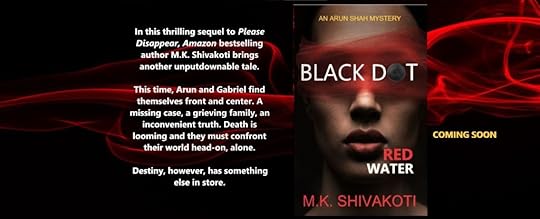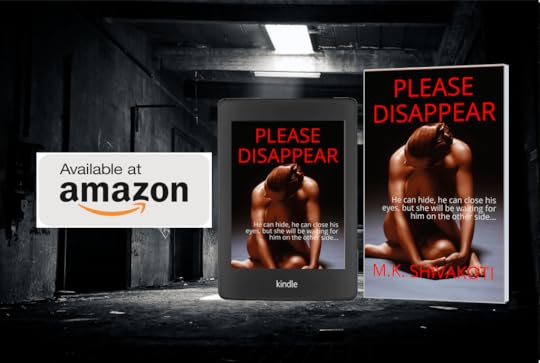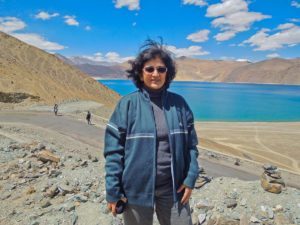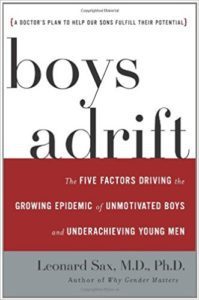M.K. Shivakoti's Blog
November 30, 2019
Cover Reveal
Very excited to release the cover of Black dot, Red water, the sequel to Please Disappear.

March 12, 2019
***Bargain Alert!***
For a limited-time, Please Disappear is available on Amazon for more than 80% discount. Check out here: Amazon Link

February 15, 2019
Goodreads Giveaway!

Please Disappear
by M.K. Shivakoti
Giveaway ends February 22, 2019.
See the giveaway details at Goodreads.
Only one week left, don’t miss out on this chance to win my book for free.
January 3, 2019
Happy New Year!
*This is a copy of the note that I sent to my subscribers earlier. If you’d like to signup to receive updates and participate in promotions, signup here.
Greetings from Chicago,
As we wrap up 2018 and look forward to 2019, I wanted to update you about some of the exciting things going on in my neck of the woods. Today it’s sunny outside and feels warm inside my house, but make no mistake, winter is in full swing here in Chicago. We just came back from a vacation in the Caribbean, so it’s extra tough getting used to the cold again. On a brighter side, we’re now in 2019, which means after a long, long, long wait, my book is finally coming out this year. Yay!
Below is the rundown of major milestones we are planning to hit in January and February:
Beginning this Saturday, January 5th, we’ll be sending all subscribers free sample chapters of my novel, Please Disappear. If you haven’t subscribed yet, you can do that here.
For the past several months, we’ve been working very hard to create a book trailer to accompany the release of the book. It’s almost complete and we’ll be releasing it later this month. In the meantime, you can take a sneak peek here: www.mkshivakoti.com. If you like what you see, feel free to leave comments and share it with others. When the full trailer is available, I’ll send you a quick note.E-books will be available for pre-order in the next couple of weeks, and will fully release on late March / early April.Paperbacks will release by May 1, 2019.
If you have any questions, please feel free to reach out to me at contact@mkshivakoti.com
Best,
M. K. Shivakoti
August 30, 2018
ARC winners, August 2018
A big thank you to everyone who signed up on Goodreads to receive an ARC of Please Disappear!
For this contest, winners were chosen at random from the pool of those who signed up on Goodreads. Congratulations to following winners!
Jenna Thatcher
Zoe-Lee O’farrell
Theresa Hetherington
Myreadbooks
Robin Taylor
Karalee Shotola
Nicola Parkinson
We’ll contact each winners individually to get them a copy of Please Disappear!
If you didn’t win this contest, you maybe interested in another contest we’re running on our website. Winner(s) get a free e-book as well.
August 11, 2018
Meet Samrat Upadhyay. Featured Author #5
Samrat Upadhyay’s latest book Mad Country is in excellent company. Alongside Mohsin Hamid’s Exit West, Jesmyn Ward’s Sing Unburied Sing, Zinzi Clemmons’ What We Lose, and Lesley Nneka Arimah’s What It Means When A Man Falls From The Sky, Upadhyay’s Mad Country has been a finalist for this years’ Aspen Words Literary Prize.
Upadhyay has not only been a rising star in international literary scene, but also a source of inspiration for many Nepali writers like me. I’m honored and thrilled to feature him on my blog.
(Like featured segment? Subscribe here so that you don’t miss out on future posts. Check out current promotion, exclusive only for subscribers!)
For those who do not know you yet, can you tell a little about yourself—don’t be shy!

I grew up in Nepal but came to the US in 1984. I was always interested in literature and writing and was a voracious reader when I was young. There was no television in Nepal in the early 80s, so reading, along with radio and cinema, was a major source of entertainment. At that time I was not a discerning reader. I used to read anything I could get my hands on: serious Hindi literature by Amrita Pritam and Premchand; detective novels in Nepali with weird protagonists; lurid Hindi crime magazines; and commercial novelists such as James Hadley Chase and Harold Robbins as well as heavyweights such as Charles Dickens. I am glad that I was not picky at that time because it allowed me to absorb everything and develop my own literary tastes. I was also a big fan of Hindi movies, and know almost all the songs from that era.
I read that you came to the US as a Business student. How did you become a writer?
I was a writer before I came to the US. I wrote in both Nepali and English until my teen years. I was the editor of my school magazine. I even had a crappy poem published in the Friday Supplement of the Rising Nepal in my mid-teens. But it was being in the US that allowed me to explore my true interests, even though I had come here initially thinking that I’d study business (because I didn’t think you could really study literature and writing for a career). I didn’t write much during my undergraduate years but during my graduate work at Ohio University I encountered an influential teacher, Eve Shelnutt. And there were other teachers later who were extremely important in my growth: Michael Bugeja, Paul Lyons, Robbie Shapard, Ian MacMillan. I started writing extremely seriously when, after a couple of years in Nepal, I returned to the US for my Ph.D.
Nepali literature has a rich history, yet in my experience writing is viewed as a mere hobby than a career in Nepali society. What has your experience been like? Have you found it being different for aspiring American writers?
It’s complex. In Nepal, it’s extremely difficult to have a career solely through writing. The publishing industry has shown good growth in the last decade, but it’s hard to make money through writing. In the US, it is possible to make money through writing, but for that one has be a commercially successful writer, which many can’t claim to be. That’s why you see many American literary writers finding refuge in academia, where teaching becomes their main source of income. Even my students, all of whom are aspiring writers, aren’t under the illusion that the commercial success of their writing is guaranteed. Many of them enter publishing or teaching or technical writing other such careers as they pursue their writing. But I think in Nepal too you’ll find many writers in other professions for whom writing is their passion, not merely a hobby.
While some writers plan their plots and characters, others have more fluid approaches. What is your writing process like?
I have a more fluid approach. I don’t like being restricted through pre-planning. I also don’t want to lose the pleasure of discovering my material as I write. To me, that’s the whole joy of writing: not knowing where the story might go, what a character might do. I not only have this open approach to writing my short stories but also my novels.
As a writer who writes in his non-native language, what challenges did you have to overcome?
Although English is not my native tongue, it became my first language by the time I was in my teens, partly through education and partly through my reading habits. The challenges in English for me have less to do with any sense of “mastery” over the language (in fact, during my first semester in the US in 1984, my philosophy professor commented that I wrote much better than most of his students who claimed English as their native tongue) than with translating the physical and emotional landscape of Nepal and being faithful to that fictional truth–while simultaneously attempting to be original and bold in my art.
I read Arresting God in Kathmandu a few years ago. What comes to mind as I think about the short story collection is wanting to know what happened next. The Kathmandu you portrayed was reminiscent of the city I grew-up in, characters were lively and authentic, I loved reading each story but was disappointed when they ended too soon. Could some of the stories have been expanded more into a novella or a novel length? How do you decide what to pursue further and what to keep short?
I think all stories can be expanded that way. My first novel, The Guru of Love, was actually an expansion of a lousy short story I’d written a while ago. In my mind, my stories, in Arresting God in Kathmandu and in other collections, are as complete as they can be–I haven’t cut them short. The readers’ experience can be entirely different, of course.
Tell us a little about Mad Country—what can readers look forward to when they pick it up?
It’s my most innovative book to date, both in form and content. I think readers used to my earlier work will find it very different.
https://www.amazon.com/Mad-Country-Samrat-Upadhyay/dp/1616957964
Who are your three favorite writers and why?
My normal list has more than three writers, but for today, let me list these three:
William Trevor–for his ability to quickly focus on the inner lives of his characters
Cormac McCarthy–for his language and his stark, brual landscapes
Rohinton Mistry–for his panoramic view of the Indian society and his attention to details.
When you are not writing, what’s your favorite way to spend time?
Reading and teaching and traveling and watching good shows and movies.
What is the best way to connect with you?
By reading my books.
Thank you Samrat dai for talking to us today! I’m looking forward to reading Mad Country and I wish you every success with this book and your future releases.
If you have comments and suggestions about featured segment, please let us know below. If there is an author, writer, musician or artist you would like us to feature, do let us know as well.
Liked this segment? Don’t miss any updates, subscribe here.
We’ll be back again with another featured artist soon. Until then, keep reading and writing. I’ll leave you with this quote to muse on.
“There is only one difference between a madman and me. The madman thinks he’s sane. I know I’m mad.” ~ Salvador Dali
June 17, 2018
Meet Adite Banerjie. Featured Author #4.
I’m looking outside my living room window but all I can see are rain droplets on the pane. Visibility is extremely poor, only the building very next to ours is slightly in view. I can hear the rain crashing on the window pane and the faint swish of cars cruising on the wet road below. In other words, a perfect day for writing. But I am taking a break to welcome a talented author from India, Adite Banerjie, on this week’s featured segment.

Tell us a little about yourself—don’t’ be shy!
The name is Banerjie. Adite Banerjie. I do wish I could introduce myself with the same swagger and style as 007 does in multiple movies. Sigh! Being an introvert, though, I would never be able to pull it off. But never mind, I have plenty of written (and unwritten) fictional characters for whom I can rustle up interesting introductions in my books and jaw-dropping entrances in my scripts.
A bit about myself: I was a business journalist for well over 20 years before I switched tracks. I have been writing romance novels and screenplays (across multiple genres). Three of my books have been published by Harlequin/Harper Collins. I have had one of my scripts semi-final at the prestigious Academy Nicholl Fellowships (yay, me!) and one of my short scripts titled 7 Lives (on organ donation) is awaiting release. I have recently turned indie author and am enjoying this new phase in my writing journey.
There are so many things one could do. Why write?
I have been a reader and movie viewer for as long as I can remember and I have always wanted to tell stories. Writing is the only way I could accomplish that!
Publishing can be a daunting process. Do you have moments of doubt? If so, how do you stay motivated?
Publishing is the outcome of months of writing and revising. The writing process itself can be daunting. You’re never quite sure whether your story is good enough, your characters are interesting and whether the whole thing will be more than the sum of its parts. There are moments when I wonder why I continue to push myself. What motivates me is experiencing that uncomparable joy of finishing something that I have created. It truly ‘completes me’. 
June 3, 2018
Meet Bert Edens. Featured Author #3
It’s finally feeling more like summer here in Chicago. There are still occasional cool days but for the most part, temperature is hovering around in comfortable range.
Today, I am featuring a multi-genre author, Bert Edens. Having gone to college in Arkansas and having an especial place in my heart for the state, I am excited to welcome an Arkansan on my blog.

Tell us a little about yourself—don’t be shy!
One thing I have always been told, since a young age, is I have a very vivid imagination. Sometimes it got me in trouble. Sometimes it got me out of trouble. On rare occasions it even made me enough money to buy some groceries, even if it was just ramen.
As a youth, maybe five or six years old, I remember hearing a friend read out loud some variation of “The Velvet Ribbon”. When her head rolled off at the end, and my apologies for the spoiler if you don’t know the story, I was hooked on storytelling, but especially horror. I was always one who read almost constantly from pretty much all genres. Even now, if someone asks me to beta read or proofread a book, if I have time for it, I will usually accept, regardless of what kind of book it is or what age group it’s for. I’m also the type who will go to a public library or bookstore, stare at all the books, then rattle off some random numbers in the following fashion: “Third row, fourth section, second shelf, ninth book.” Then I will go find that book and read it, no matter what it is. I’ve discovered some amazing authors that way. I remember in elementary and junior high literally, not figuratively, running out of books to read in the respective school libraries. Fortunately, public libraries are stocked more fully.
Like many people, I had some challenges growing up, ones that are in much clearer perspective now than at the time. But I learned and grew from them. And I developed some stories. People who haven’t had struggles in their lives don’t seem to have as many interesting stories to tell. Those who have seen the darkness, felt it seep deep into their core, and still come out the other side a fractured but somehow more complete person? Yeah, those are the people I want to hang out with.
As a young adult, newly married to Jann, a woman who had the patience of Job with me, I had no idea what made a healthy relationship work. So, we learned together. I made mistakes. I’m blessed she only tried to kill me once. And stories were developed.
My older son, Zak, was born prematurely by a full month, which was a near death sentence in 1993. He spent two weeks in neonatal intensive care. We almost lost him at birth and once more while he was in the NICU. He grew, he struggled, he thrived, we learned. More stories were developed.
My younger son, Josh, was born in 1996. Just the opposite of Zak, he was always ahead of the curve, in the gifted and talented programs, an amazing artist, a terrific storyteller, and most importantly possessing a heart bigger than the world. He was such a sharp counterpoint to his brother developmentally, and sometimes he suffered while we kept his brother going along. Through all that growth and struggle, more stories were formed.
In 2011, Jann died very suddenly, when my boys were 14 and 17. It was a time of chaos and adjustment for boys already knee deep in their teens, especially Josh, who was particularly close to Jann. During one fourteen month stretch, he lost five people close to him, including his mother and best friend. We bumped along the road, bumping into each other, treading water and putting one foot in front of the other the only way we knew how. Through all those devastatingly dark days, we came out the other side better than we went in. I wouldn’t wish it upon anyone though. And yet, through all of that came more stories to tell.
Four years after that I found myself sitting across the table at a Mexican restaurant, talking to Carrie, an amazing woman who had been through some incredibly dark days herself, ones I have no way of fully relating to because both of my children are still living. A quick lunch date turned into four hours of relaxed, feel-like-I’ve-known-you-forever conversation. Four days later, we had a second date, three days after that, we had a third, In June of 2018, I will put a wedding band on her finger. We are planning our futures together when both of us were sure at one time no such future existed. I see many more stories to write, and I can’t wait to see what they are.
There are so many things one could do. Why write?
I’ve always been a storyteller, even as a little kid. My mom would tell you I always told stories, but especially the kind that would get my hide tanned for fibbing. 
May 20, 2018
Meet Erin Grey. Featured Writer #2
On this week’s featured segment, we are delighted to have Erin Grey from South Africa!
First thing first, any connection to Mr. Christian Grey from the popular novel?
He’s the distant cousin we do not discuss. I think he was dropped on his head as a child. Repeatedly. And no, I’ve never read the books. There’s far too much good literature out there to waste time on glorified porn.


May 15, 2018
Boys Adrift, a review
I came across this book last December. A colleague gave this to me as a gift after learning that I am a father of a five year old boy. Later, I learned that he had given fifteen more copies to his son’s school, hoping the teachers there would read it. Clearly, he thought highly of this book, and it had piqued my interest as well. But as usual, I had too many books that I wanted to read and not enough time. So, it had been sitting on my bookshelf, collecting only dust, until I finally got to it last week.
I couldn’t agree more with my colleague. ‘Boys Adrift’ is the most important book I have read all year.

Dr. Leonard Sax lays out very clearly what’s happening to boys in America today, why it’s happening, and what we can do as parents. For the sake of the young man in your life, consider reading this book. However, if you want to know a little more before committing to the book, below is a snapshot of what I took away.
What’s the problem?
“Men are minority at college, and they have been for three decades now. Women are now more likely to attend college than their brothers are; and, once enrolled, women are now more likely than their brothers to earn a degree. Among those pursuing advanced degrees in American universities, women now outnumber men by 59 percent to 41 percent.”
“The boy does not seem to have the drive his sister has.” While the sister has multiple job offers in the 100k range immediately upon graduation, the brother takes longer to graduate, works part-time at starbucks after graduation and lives at home with his parents. “What is more strange is that the young man isn’t bothered by his situation.”
“Not all boys have been infected by this weird new virus of apathy…Because we still see some of these successful young men around us, it’s easy to miss the reality that more young men than ever before are falling by the wayside on the road to the American dream. The end result: frantic parents wondering why their son can’t, or won’t, get a life. He’s adrift, floating wherever the currents in the sea of his life may carry him–which may be no place at all.”
Why is this happening?
We have a school system that does not take gender difference into consideration. Developmentally, a five-year-old boy may only be on par with a three or a four-year-old girl. But in kindergarten, all kids are expected to sit still and carry out tasks for which boys may not be ready yet. The results are astounding. Girls are achieving in every measurable way while boys are turning into “slacker-dudes.”
What motivates girls may be different from what motivates boys. Some boys thrive in competition. “Everybody is a winner” culture discourages their drive to win. They turn toward video games because it allows them to compete and earn a first place, an opportunity many boys are not finding in their school these days.
Boys are far more easily diagnosed with ADHD than girls are. In addition, “there is a growing tendency to prescribe medications such as Adderall, Ritalin, Concerta, Metadate, Focalin, Vyvanse, and other stimulants to children, particularly boys. Research suggests that these medications may have adverse consequences that your doctor may not know about–adverse consequences not for cognitive function, but for motivation.”

Boys are getting a double whammy. First, they are asked to do tasks they may not be ready for, then they are medicated so that they can catch up with the girls. “The most serious cost of taking these medications may be a loss of drive.”
“…some characteristics of modern life–toxins found in the food we eat and water we drink–may have the net effect of emasculating boys. We will see that the average young man today has a sperm count much lower than what his grandfather had at the same age. Likewise, a young boy today has bones that are significantly more brittle than a boy of the same age 30 years ago.”
What can we do as parents?
Luckily, Dr. Sax offers solutions that we parents can implement. For example, we can wait until our sons are six years old before enrolling them in kindergarten. By then, their brain will have developed enough to carry out tasks expected of them in school.
I know what you are thinking. This means one additional year of expensive day-care, right? Right, there’s no denying that. But there is another way of thinking about this as well. You may want to send him to college at some point. Maybe you have started a college savings account in his name. What good would that college fund do if he were to lack the motivation to go to college in the first place? A gift of delayed kindergarten may give him a better foundation for the rest of his life.
To be fair to the author, who clearly spent lot of time researching, and offering solutions in his book, I don’t want to spill all his findings in my blog. If what you read so far interests you and concerns you, then you should pick up a copy available on amazon.com.
My Goodreads rating: here
Liked what you read? Don’t forget to subscribe.
If you have thoughts or suggestions, please add your comments below.



